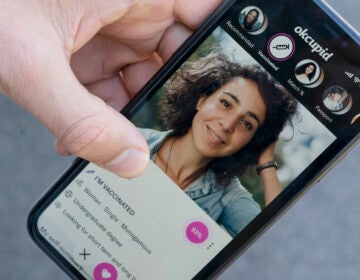Former slaves brought Thanksgiving to Liberia — and rebooted it

Thanksgiving is a day at the beach — quite literally — for young Liberians. Above, the beach in West Point is a sandy playing field for soccer lovers. (Tommy Trenchard for NPR)
The West African nation of Liberia was settled 200 years ago by people of color from the United States. Brenda Brewer Moore can trace her family history back on both sides to former slaves who became some of the most prominent figures in their newly adopted country — explorers, surveyors, ambassadors. These settlers, known as Americo-Liberians, brought cultural traditions across the Atlantic Ocean with them, including Thanksgiving.
The two countries’ observations of the holiday have diverged over the centuries. Liberian Thanksgiving falls on the first Thursday of November, rather than the fourth. There’s no traditional meal, notes Moore, whose two kids, ages 12 and 14, normally end up eating pizza and popcorn. In Liberia, those who celebrate tend to view it as a religious occasion, she explains. For those who don’t, it’s a day whose U.S. origins are often a point of contention.
Moore has a lot of titles. She’s the published author of children’s books, a women’s rights activist, an HR professional, a snail farmer, a Senior Fellow at the Aspen Institute and the founder of the Kids’ Educational Engagement Project, which she launched during the Ebola crisis to connect students to academic resources. We asked her to take on an additional job: explain Liberian Thanksgiving to Americans.
How exactly do Liberians celebrate Thanksgiving?
It depends on who you talk to. When I was growing up, what I remember is that my mother, who was very religious, would insist we go to church. And that’s how we spent almost the entire day because it became a long, drawn-out affair of thanking God for life, thanking God for health. And if you know anything about Black culture, a one-hour service can very easily be drawn out to 3 hours. One person gets up to give testimony, and then they keep interrupting with “Hallelujah!” and “Praise the Lord.”
Some other families have barbecues and grill at home. I don’t like to cook, so for my family, we see it as a nice holiday to rest and watch movies. I’ve been very deliberate about not doing some of the things my mom insisted that I do, like staying 5 or 6 hours at church. If you get a day off from school and work, rest.
I’m 42, but if you’re asking someone 20 years younger than me, they will most likely tell you they spend the entire Thanksgiving Day on the beach hanging out with friends. Some people see Thanksgiving as an imposed holiday of the settlers from the U.S. Why should we be celebrating a holiday that’s been imported?
Is there a local holiday that’s more analogous to American Thanksgiving?
So besides Independence Day, the holiday I’ve seen people celebrate, regardless of whichever side of the [Thanksgiving] divide they’re on, is the birthday of a former president: William Tubman. It’s November 29. And it’s no longer about him. It’s just the holiday that’s adopted as the launch of summer. This is the launch of our dry season, our summer season. It’s probably the third biggest holiday after Christmas and Independence Day. You have Nov. 29 and that’s when everything really shuts down. People have big cookouts and come together on the beach.
So I guess November isn’t harvest season — it’s the end of the rainy season. What’s that like?
When it rains here, it rains! The rain droplets are almost like a massage. We go through six months of heavy rainfall, and then people look forward to the end of November when rain starts to stop. I think people are more connected to the word “thanksgiving” on that day because it’s so celebratory.
You’re a snail farmer. Is that a traditional Liberian food?
Snails aren’t a traditional food of Liberia but it’s a much loved delicacy. West Africans love snails, seasoned with a lot of chili and pepper — we like very spicy food.
What kinds of dishes are normally served at big parties on holidays?
When you consider food Liberians love, and we definitely have at family events, it’s jollof rice. There’s no comparison with Ghanaian jollof and Nigerian jollof. Ours is just on a different plane. If you order right now a Ghanaian jollof, Nigerian jollof and Liberian jollof, just presentation alone is going to tell you because we cook ours with vegetables and different types of meat. We have prawns in there, and chunks of chicken, meats, pork. Ghanaians and Nigerians will just have chicken by itself. That’s not jollof. With us, if you cook food in Liberia and you cook only one meat, we consider that a poor man’s food. Things are hard on you. If you just have one meat, people are going to say this wasn’t nice.
What are Liberians thankful for?
It evolves over time. Fifteen years ago, people were thankful for peace. We had just come out of the civil war, so it was, “Let’s thank God for peace, thank God for security, thank God for stability.” There was a time when the country was separated in the sense that you couldn’t move to another part of the country freely because of the conflicts and you couldn’t access certain resources.
Now we’re thankful we’re not having flooding like our neighbors next door in Sierra Leone. We’re thankful we have a peaceful transition in government because usually our elections take place this time of year. So there are a lot of prayers around peaceful elections.
What are you thankful for personally?
I am thankful that two months ago, we launched our 25th library. Our organization goes around and creates libraries in rural communities. When I started this in 2014, if anyone had said, “This is where you’re going to be nationally, in terms of impacting thousands of children’s lives and being so involved with the education sector,” I’d have said, “Ha ha, me?” So I just am thankful for the resources that we’ve been entrusted with by Liberians, the reception from the communities that we go in. And I’m thankful for my family. My family has been very supportive, because doing what I do requires me being away from them very often.
And I’m thankful for peace. Because I experienced the civil war — on different spectrums, running, hiding. I’m thankful that my kids don’t have to experience what I had to experience. This morning, driving to work, I tried to give them chewable multivitamins. And they were refusing it. Every morning, it’s a hassle with them. And so I told them, “Let me tell you why I’m always adamant about you taking your multivitamins.” I told them during the war, a lot of us became stunted. We didn’t grow as we should have grown because we didn’t have access to the kind of nutrition that growing kids should have access to. And now I don’t want you being 42 and 5’1″ like I am. I want you growing to your full possible genetic height. And so I want you to grow and eat your vegetables. The things we take for granted now are things that were a luxury for us before.
What should Americans know about Liberia this Thanksgiving?
Liberia has had over the years a very strong connection with the U.S. And I think as we go further, as we evolve as a nation, people are starting to question this relationship and just how much the American culture influences our culture in terms of how we dress, how we talk. Or just how much of that father relationship has really benefited our country in a way that’s sustainable after almost 200 years. The youthful generation has access to more information. There are a lot of more people that are interested in social justice issues and not being as afraid to ask questions like our parents and forefathers were.
A little too much of our identity has been attached to the U.S., and some of it hasn’t been realistic. So the U.S. takes its independence in July. We take ours the same month. America takes their Thanksgiving in November and we take our Thanksgiving in November. We do elections at the same time of year America is doing elections. But it rains heavily here, so you have low voter turnout. So we as a people are questioning a lot more now. I think it’s a good thing and I think we should be thankful for that because in the process of questioning, we are able to reflect and hopefully effect change.
Vicky Hallett is a freelance writer who regularly contributes to NPR.
9(MDAzMzI1ODY3MDEyMzkzOTE3NjIxNDg3MQ001))




